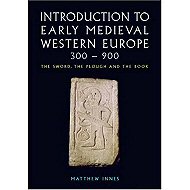Introduction to Early Medieval Western Europe, 300-900:
The Sword, the Plough and the Book
|
|
Mathew Innes
|

|

Surveying the period of European History during the years 300-900 AD, this comprehensive and stimulating book is the first to present the last twenty-five years of research in an accessible manner for undergraduate students. It is unique in combining an account of the historical background of the period with discussion of the asocial, economic, cultural and political structures of the societies within it.
Introduction to Early Medieval Western Europe, 300-900 includes:
* chapter summaries and chronologies
* key topic essays discussing archaeological or documentary evidence
* maps plus supporting illustrations from archaeological and historical finds
* bibliographical essays which discuss available sources and further
reading, introducing teachers and students to specialist literature
* a comprehensive index.
Key topics discussed are:
* why the Roman Empire broke down so irrecoverably in western
Europe
* how it came to be replaced by radically different political systems
* why the city -based state structure of antiquity was replaced
* how and why the division between civilians and military broke down
* the conversion of western Europe to Christianity and the establishment of
the church as the central social institution
* what madder western Europe's experience so distinctive in this
period
With its synthesis and interpretations of otherwise unavailable primary research, and its carefully constructed textbook features, Introduction to Early Medieval Western Europe is ideal for students of late antique or early medieval history and will also be an invaluable resource for researchers and postgraduate students worldwide.
Mathew Innes is Professor of History at Birkbeck College, University of London. His book State and Society in the Early Middle Ages won the Royal Historical Society's Gladstone Historical Book Prize in 2000 and his research was recognized by the award of a Philip Leverhulme Prize in 2004.
|
|
